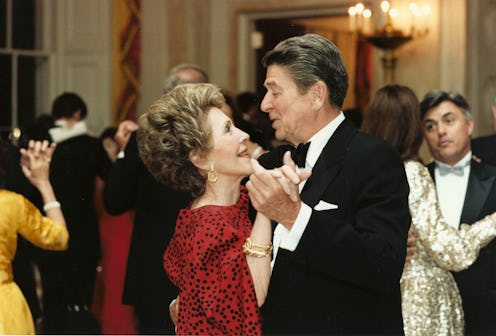News
How Nancy Reagan Beautifully Empowered Women
News that late President Ronald Reagan's wife had died Sunday hit hard, inspiring numerous tributes to the former First Lady, many of which praised her heroic devotion to her husband. But this formidable First Lady should be remembered as more than a protector and doting wife, as she helped blaze a trail of liberation for women who just wanted to do their own thing no matter what society said. Nancy Reagan's legacy as a feminist icon might surprise you.
When reflecting on feminist First Ladies, it's easy to overlook Reagan amid the zealous activism of Eleanor Roosevelt and Betty Ford. But the conservative icon was, in fact, an empowered national symbol for a model of feminism that continues to endure a barrage of criticism today. Although Reagan might not have used the f-word to describe herself, her indomitable spirit and unapologetic sense of self served as a subtle form of advocacy for women's independence.
Reagan's legacy as a caring wife and mother is undeniable, but her choice to stay at home as the primary caretaker for her family definitely doesn't mean she wasn't a strong example of a liberated woman. Throughout her tenure as First Lady, Reagan fought against criticism she was anti-feminist because she put aside her own career after marrying in order to devote herself to being a wife and mother. Reagan's struggle is proof women have been told they should Lean In long before Sheryl Sandberg's book hit shelves in 2013, but it's important to remember that "leaning out" is OK, too. Women should be free to run their lives in whatever manner they see fit without judgment, and that's just what Reagan did.
Prior to her marriage, Reagan was an independent working gal who lived alone first in New York and then later in California, paying her bills with acting jobs. She put aside her career as a Hollywood actress a few years after she married Reagan and gave birth to their first child, Patricia. In the 1980s as the women's liberation movement picked up steam, Reagan's decision to forgo her own career often made her a target of feminist critics. But Reagan rightly put critics in their place in 1985 when she told McCall's magazine she was upholding feminist principles by doing exactly what she wanted to do with her own life.
Feminism is the ability to choose what you want to do. And, actually, when you look at my life, I've really enjoyed the best of two worlds. I chose to have a career, and I enjoyed it while I had it. ... But then I met my husband, and I chose to give it up. ... I'm doing what I want to do.
Reagan moved into the White House in 1981 under a flurry of criticism — $225,000 worth to be exact. She spent the first nine months of her husband's presidency struggling to overcome public criticism (driven by the media) that she frivolously spent money after purchasing $200,000 worth of china for the White House and having a $25,000 budget for her inaugural wardrobe. However, Reagan did a lot more than wield the White House pocketbook. She held a significant amount of power and influence behind the scenes while her husband was president, as evidenced by her driving Reagan to fire then-White House Chief of Staff Donald Regan in 1987 amid the Iran-Contra scandal.
However, contrary to what many critics claim, Reagan didn't live in the shadows of her husband. As dedicated as she was to her husband, Reagan possessed a very strong sense of self and established herself as an active advocate for her own causes. She launched the successful Foster Grandparents program and the "Just Say No" anti-drug campaign. After an assassination attempt was made on her husband, Reagan became a symbol of strength for the nation. After leaving the White House, Reagan worked with Ted Kennedy to promote the benefits of stem cell research.
Like a true icon of empowered womanhood, Reagan knew what she wanted and went after it without apology. With elegance and grace, she rebelled against critics who attempted to dictate how she should act and what she should do. And if advocating for a woman's right to do exactly as she pleases isn't feminist, what is?
